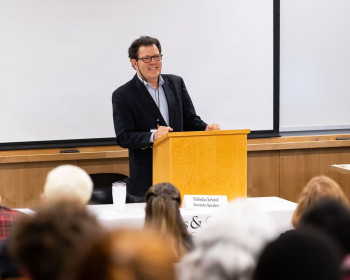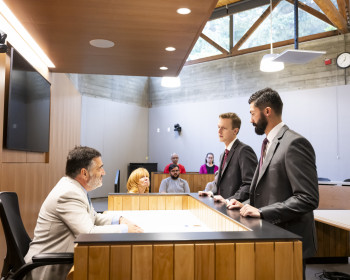Jan Pierce Retires After 19 Years
Open gallery

Generations of Lewis & Clark Law students can trace their legal career to one man: Jan Pierce, Clinical Professor of Law and Director of the Low Income Taxpayer Clinic (LITC). Pierce is retiring this year after starting the LITC in 2000 and leading it for 19 years.
For those 19 years, Pierce guided students in developing lawyering skills not typically taught in the doctrinal classroom. He taught students how to interview and counsel clients, investigate facts, develop the theory of the case, think strategically in litigation, advocate for clients in pleadings and oral argument, negotiate with the opposing counsel, maintain client communication and manage a client caseload.
Through the LITC, Pierce offered students opportunities that many lawyers never obtain during their careers, such as arguing before the Ninth Circuit. Through those experiences, students gained the confidence of knowing they could practice law. Moreover, they learned that they could make a difference in the lives of clients.
Pierce continues to mentor alumni throughout their careers and reach out to them when he learns of opportunities that may interest them. The Oregon State Bar New Tax Lawyer Committee recognized Jan as an outstanding mentor by awarding him their Mentor of the Year Award in 2017. In 2019, the Oregon State Bar Tax Section honored Jan’s contributions to the profession by presenting him with the highest honor the Section gives, the Award of Merit.
Pierce was the first, and, until recently, the only director of the Low Income Taxpayer Clinic. In the spring of 2000, tax professor Jack Bogdanski applied for, and the law school received, a grant from the IRS for the LITC. This happened to coincide with Pierce’s retirement from the IRS, and he took up the task of establishing the LITC.
About 141 LITCs serve clients nationwide, all of whom receive a matching grant from the IRS. About 25% to 30% of them are run through law schools, while the remainder are sponsored by Legal Aid or other nonprofit and public service organizations.
“We were extremely fortunate that Jan answered our request to lead the LITC in 2000,” said Dean Jennifer Johnson. “He has consistently provided outstanding leadership and guidance to both our clinic students and clients. We will miss his gentle teaching style and his passion for the little guy.”
Under Jan’s leadership, Lewis & Clark Law School’s LITC has handled sophisticated tax controversy work over the years. “Several years ago we tried a fraud case which involved over $1.3 million, where the IRS had already collected $900,000 of that amount before trial based upon a jeopardy assessment and jeopardy levy,” Pierce recalls. “We were able to get over two thirds of the $900,000 back for the client.”
Unlike other LITCs, Lewis & Clark Law School LITC has recovered attorney fees from the IRS four times. “From 2000 to 2015 we recovered $150,000 in attorney fees or about $10,000 per year,” said Pierce.
Other notable cases included two appeals to the Ninth Circuit. “In the first case, the IRS conceded after briefs were filed,” recalls Pierce. “In the second case, the Ninth Circuit reversed the U.S. Tax Court, which had decided that we were not entitled to attorney fees. This case involved a legal issue, and it was an issue of first impression. One of our clinic students made the oral argument in this case in spring of 2015.“
“The thing that I am most proud of is to see the students we have had at the clinic through the years become successful attorneys,” said Pierce.
Pierce’s philosophy at the clinic was always to ‘learn by doing.’ “Many students learn better by actually doing the work, than by sitting in class,” he describes. “One thing that sticks out in my mind is that in almost all of the graduations that I have attended through the years, I find out that students who did amazing work at the clinic had average grades or even below average grades, and that some who graduated with honors, were very average clinic students.”
During his tenure at the IRS, Pierce handled hundreds of federal tax controversies as a docket attorney, and then supervised government attorneys working on both civil and criminal matters relating to federal taxes. At one time he supervised the criminal tax work done by IRS attorneys in the four-state area of Oregon, Washington, Alaska, and Hawaii.
Pierce received his undergraduate degree and his law degree (with honors) from Washburn University in Topeka, Kansas. After graduating from law school, he spent two years as a law clerk to a federal district judge in Topeka, Kansas. Pierce is a member of the state bars of Oregon, Kansas and the U.S. Tax Court. He is also a member of the Standing Committee on Judicial Placement and the Business Law Committee.
Editor’s Note: Grateful students have set up a Jan Pierce Legacy Fund to further the work of the Low Income Taxpayer Clinic. To make a donation click here.
Law Communications is located in room 304 of Legal Research Center (LRC) on the law Campus.
MSC: 51
email jasbury@lclark.edu
voice 503-768-6605
Cell: 626-676-7923
Assistant Dean,
Communications and External Relations, Law School
Judy Asbury
Law Communications
Lewis & Clark Law School
10101 S. Terwilliger Boulevard MSC 51
Portland OR 97219

